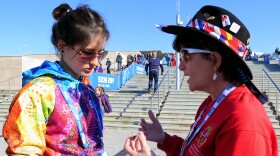On this installment of ST, a chat with the British scholar, journalist, and author David Goldblatt, whose new book -- arriving just in time for the Summer Games in Brazil -- is "The Games: A Global History of the Olympics." As was reecntly noted of this thorough and well-researched (and often quite opinionated) history of the modern Olympic games by a critic for the UK's Guardian newspaper: "Sport is many people's first exposure to international relations, and it's often not a bad primer on who's got a beef with whom. When the Soviets bashed seven bells out of the Hungarian water polo team at Melbourne's 'Friendly Games' in 1956 -- the 'blood in the water' match that Hungary won 4-0 -- it was obvious that this was more than a game, even if the deeper significance was mostly unspoken at the time. To this end, the Olympics can be taken on face value as a sporting contest, but it is more intriguing -- and can only properly be understood -- by examining its social and political context. This is the premise for David Goldblatt's new book...which is pretty much the story of the 20th and 21st centuries. The tale starts with the Athens competition in 1896, an all-male, all-white affair; by 1900, women were allowed to compete in tennis, golf, croquet, equestrianism, and sailing; and in 1924, William DeHart Hubbard became the first African American to win a gold medal (a feat that went unreported in the mainstream US media).... [This] book is ambitious and might have been daunting, but Goldblatt is a well-qualified guide, bringing the kind of insight and scale he brought to his heroic history of football, 'The Ball Is Round' (2006).... While his background and rigor is that of the academic, Goldblatt's inclination is towards the eccentric and the anecdotal. This makes 'The Games' an easy, enjoyable read, full of odd trivia -- like the fact that Antwerp in 1920 awarded medals for popinjay shooting, a popular Flemish pastime.... Mostly you are left with the sense at the end of Goldblatt's book that the Olympics will continue to be chaotic, inspiring, incomprehensible, and unmissable. Much as it has been since 1896."
"The Games: A Global History of the Olympics" by David Goldblatt














